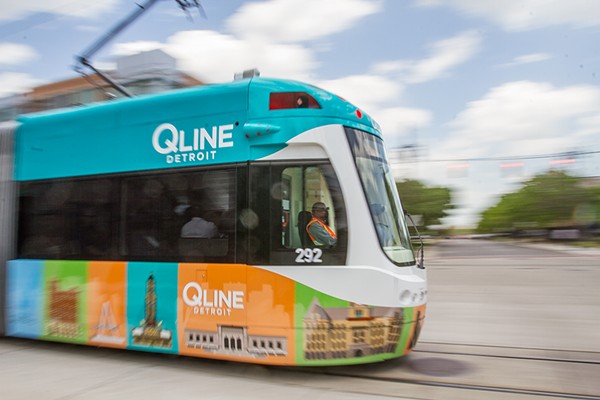
Steve Neavling
Since its debut in 2017, the QLine has been beset by delays, infrequent stops, low ridership, mechanical failures, and a ballooning budget.
Metro Detroit taxpayers could soon be on the hook for operating the underperforming QLine streetcars in Detroit.
The Regional Transit Authority of Southeast Michigan (RTA) is considering taking over the QLine from the nonprofit M-1 Rail, which has controlled the streetcars since they debuted in 2017.
The hope is that the QLine won’t cost the RTA additional money, but it’s no guarantee.
Part of the idea is to integrate the streetcars with other modes of public transportation.
“It is the role of the RTA to ensure the ongoing viability of regional transit services,” Dave Massaron, chairman of the RTA Board of Directors, said in a statement. “This transition will help ensure the QLINE remains as a transit option for the community and the city of Detroit long into the future.”
But past efforts to hand over the QLine to the RTA have failed, in large part because suburban taxpayers don’t want to finance a 3.3-mile rail system that serves a relatively small population miles away in Detroit. Six months before the QLine launched, voters in Oakland and Macomb Counties rejected a tax increase to fund the RTA; no surprise considering Oakland County executive L. Brooks Patterson and Macomb County executive Mark Hackel refused to support the RTA millage in part because of the proposal to transfer oversight of the streetcars to it.
Since its debut,the QLine has been beset by problems, including service delays, infrequent stops, low ridership, mechanical failures, and a ballooning budget.
To boost ridership, the QLine has stopped charging a fee to use. Fares previously ranged range from $1.50 for three hours to $3 a day.
Ridership increased 62% from January to August of this year, compared to the same period in 2022, according to the QLine’s annual report. The system averaged 2,629 riders in the first eight months of this year.
“QLINE is an asset that was always envisioned as one piece of a larger, connected regional transit system,” M-1 RAIL President Lisa Nuszkowski said in a statement. “Now is the time to make this transition. Performance has never been better. Ridership is approaching 1 million for the year, and the system’s finances are sustainable over the long-term.”
Despite the increase, ridership is still far below the 5,000 to 8,000 daily riders that were projected when the system was being built. The QLine also had more daily riders in 2017 and 2018.
As a result of the low ridership and lack of fares, the streetcar system is far more costly than previously envisioned.
In December 2022, Gov. Gretchen Whitmer signed legislation to subsidize the QLine with $85 million through 2039. That amounts to $5 million a year — or more than half of the streetcar’s annual operating budget of roughly $10 million, which has nearly doubled over the past six years.
The streetcar, which has served as more of an economic development engine for downtown than a transportation solution in a city where a quarter of residents don’t have a car, wasn’t supposed to heavily rely on tax dollars to operate. When the QLine launched in 2017, boosters insisted that a vast majority of the operations would be paid for by fares and private funding.
To get the QLine up and running, the U.S. Department of Transportation dished out $37.2 million, and another $41 million in public money came from the state of Michigan, Wayne County, Wayne State University, and the Detroit Downtown Development Authority. In total, 42% of the QLine’s startup costs, including building the rails and buying the streetcars, came from public and quasi-public money.
Meanwhile, Detroit’s bus system, which many residents rely on for everyday transportation, is plagued with delays and remains a constant source of complaints. Many public transportation advocates question why so much money has been spent on a relatively small track that is nowhere close to where most Detroiters live.
It’s too early to say whether the streetcars will cost taxpayers more money. RTA officials insist they will only take over operations if the burden isn’t shifted to taxpayers.
It’s also unclear whether fares would be reinstated.
If the past is any indication, projecting the costs of the QLine is no easy feat.
“We are still in the due diligence phase, and we are studying how this transition will work from a legal, financial, technical, and administrative perspective,” RTA Executive Director Ben Stupka said in a statement. “We will continue to discuss the plan at future Board meetings, with a goal of understanding the impact of this transfer with a targeted decision in early 2024.”
Subscribe to Metro Times newsletters.
Follow us: Google News | NewsBreak | Reddit | Instagram | Facebook | Twitter

